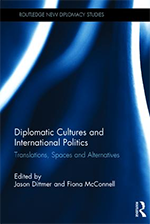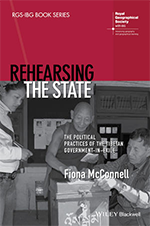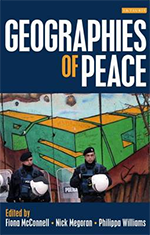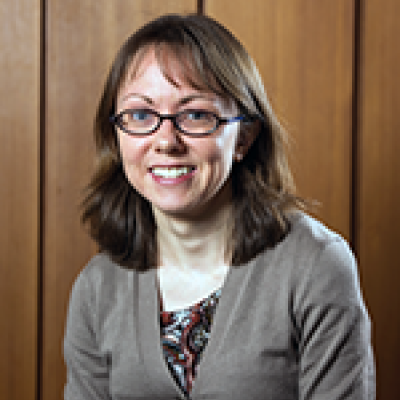Professor Fiona McConnell
Professor of Political Geography
Fellow and Tutor at St Catherine's College, Oxford
Professor of Political Geography
Fellow and Tutor at St Catherine's College, Oxford
Academic Profile
Fiona McConnell is Professor of Political Geography and Tutorial Fellow at St Catherine's College. She joined the School of Geography and the Environment in 2013. Prior to this she was a lecturer in human geography at Newcastle University and has also held a Junior Research fellowship at Trinity College, Cambridge, and an ESRC postdoctoral fellowship at Newcastle University. Fiona has a BA in Geography from the University of Cambridge (Fitzwilliam College) and PhD from Queen Mary, University of London.
As a political geographer Fiona's research aims to develop new areas of thinking regarding governance beyond the state, how political legitimacy is articulated by marginalised communities, and changing practices of diplomacy and mediation. Fiona was awarded a Philip Leverhulme Prize for Geography in 2019 and the Back Award from the Royal Geographical Society in 2022, and held a British Academy Mid-Career Fellowship in 2017. She was an Associate Editor at Political Geography 2016-19, and serves on the editorial boards of Geopolitics, The Geographical Journal and Environment and Planning C: Politics and Space. Fiona also sits on the Board of Directors of the Tibet Justice Center and the Unrepresented Nations and Peoples Organisation.
Current Research
Driving much of Fiona's research has been an interest in how communities officially excluded from formal state politics are nevertheless engaging with aspects of statecraft, and in using such seemingly anomalous cases as a lens to critically examine the 'norms' of governance. Her doctoral and post-doctoral research focused on the political institutions and practices of the exile Tibetan government based in India. She has an ongoing interest in how political legitimacy is claimed, constructed and contested, particularly in the so-called margins of geopolitics, and in practices of peace, diplomacy and mediation.
i. Practices and pedagogy of diplomacy in the margins
Fiona is interested in changing geographies and practices of diplomacy, with a particular focus on the diplomatic role of stateless actors. Working with the Unrepresented Nations and Peoples Organization (UNPO) she has examined the barriers faced by stateless communities in engaging with diplomacy, particularly at the UN, and the innovative strategies they use to make their voices heard. She is using funds from her Philip Leverhulme Prize to scale up her research on stateless communities by mapping hitherto hidden geographies of diplomacy and establishing new ways of thinking about diplomacy as an inherently spatial practice. This includes the notion of 'liminal geopolitics' to think through political subjectivity, brought theories on performance, rhetoric, and emotional labour to bear on diplomacy, and work with Costas Constantinou (University of Cyprus) on the notion of a right to diplomacy, with Elaine Ho (NUS) on diaspora diplomacy, with Chih Yuan Woon on the spatial dynamics of contemporary Chinese diplomacy, and with Alex Manby (Oxford) on digital mediation.
Related to this work is an interest in the pedagogy of diplomacy. Fiona worked with Ruth Craggs and Jonathan Harris (KCL) on a Leverhulme Trust funded project 'Training Diplomats of Postcolonial African States, 1957-1997'. The project analyses geopolitical dynamics of the training of diplomats from newly independent African states, focusing on the spaces, networks, and power relations of learning to be a diplomat. Working with Liam Saddington (Cambridge) Fiona developed 'Model UNPO' teaching resources that can be used in secondary schools, primary schools and by diaspora communities. This initiative has been funded by a Ray Y Gildea Jr Award (RGS-IBG) and University of Oxford's Public Engagement with Research Seed Fund.
ii. Geographies of peace and mediation
Working with Nick Megoran (Newcastle) and Philippa Williams (QMUL), Fiona has been developing a research agenda around geographies of peace. Their focus is on contextualised and contingent practices of peace, and their work seeks to critically unpack the nature of everyday peaceful existence and ask who peace is for.
Extending this work to issues of mediation, Fiona was PI on the ESRC GCRF funded project Gobi Framework for sustainable infrastructure development: scaling up praxis from Mongolia to Central Asia (2018-2021), working alongside Troy Sternberg and Ariell Ahearn at Oxford. This project was a collaboration with the University of Central Asia and the Independent Research Institute of Mongolia (IRIM) and it developed a framework for sustainable infrastructure development in the context of large scale mining initiatives in Mongolia and Kyrgyzstan.
iii. Legal geographies
Fiona has been working with Katherine Brickell (KCL) and Alex Jeffrey (Cambridge) to examine how geographers contribute to the making of law. She has also been researching self-determination – a geopolitically important but often misunderstood right – reimagines it beyond its Western colonial associations in international law, and drawing out the geographies of this right.
Teaching and Supervision
Fiona runs a Final Honour School option course 'Geopolitics in the Margins', convenes and teaches on the FHS course 'Space, Place and Society' and teaches on Prelims Human Geography.
At St Catherine's College, Fiona and her colleagues are responsible for teaching students across the entire breadth of geographical topics for the Preliminary Examination and Final Honour School of Geography.
Fiona welcomes enquiries from individuals wishing to undertake doctoral or post-doctoral research in the following broadly defined areas: contested sovereignties; practices and pedagogies of diplomacy; peace and non-violence; the Tibetan diaspora; marginality and liminality.
Current Graduate Research Students
| Rachael Chan | Indigeneity and Cultural Diplomacy in Taiwan |
| Tiger Hills | Constituting and contesting urban displacements: the political geographies of parks in Vancouver |
| Jin Hee Lim | Infrastructural intersection and everyday experiences of state and status in Northern Thailand |
| Kelsey Monteith | Gypsy-Traveller Domicide: exploring the notion, making, and unmaking of Gypsy-Traveller homes |
Recent Graduate Research Students
| Tarek Kheir Eddine | The impact of confessional politics and socio-economic stratification on the use and development of public spaces in Lebanon | |
| Alexander Manby | Geographies of Naga (Inter)nationalism 1946-2022 | |
| Shona Loong | At the margins of a "development darling": civil society, territory, and development in Karen State, Myanmar | |
| Janak Padhiar | Towards understanding life course geographies of young Afghans in India | |
| Liam Saddington | Rising Seas and Sinking Islands: The Geopolitics of Climate Change in Tuvalu and Kiribati | |
| Alice Watson | "And now on Radio 4...": imaginative geographies of migration on the airwaves | |
| Serkan Birgel | Peacebuilding through natural resources - the case of Cyprus | |
| Saher Hasnain | Food environments in Islamabad, Pakistan | |
| Viresh Patel | Changing contours of sociality: Youth, education, and general relations in rural Gujarat, India |
Selected Publications



Reports
- Brickell, K., Jeffrey, A. and McConnell, F. (2022) Geographers and legal impact: scoping the field. Royal Geographical Society (with Institute of British Geographers).
- McConnell, F., Manby, A., Monje Cano, M., and Bunche R. (2020) Compromised Space and Undiplomatic Immunity. UNPO.
- Liddell, I., McConnell, F. and Nodari, T. (2019) Compromised space: Bullying and Blocking at the UN Human Rights Mechanisms. UNPO.
- McConnell, F. (2019) The challenges faced by stateless communities at the UN. Geographical Magazine, 2 December 2019
- Liddell, I., McConnell, F. and Nodari, T. (2017) Unrepresented Diplomats Project: UN Advocacy Training Pack. UNPO.





